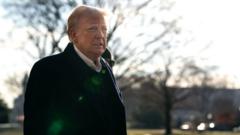The Trump administration conducted a significant purge of federal inspectors general on Friday night, terminating at least a dozen watchdogs in what many are calling a controversial and possibly unlawful move. Senate Minority Leader Chuck Schumer characterized the firings as a "chilling purge," arguing that they reflect Trump's fear of accountability and disdain for transparency.
The White House has yet to confirm the dismissals, leaving inquiries from various news outlets unanswered. Affected inspectors general received abrupt notifications via email, stating their positions had been terminated due to “changing priorities.” Among those dismissed were the inspector general for the Department of Health and Human Services and the inspector general for the Small Business Administration, with reports indicating that additional watchdogs from multiple departments, including agriculture and labor, were considered for termination.
The inspectors general serve as critical oversight mechanisms, established in the aftermath of the Watergate scandal to promote transparency and integrity in government operations. They are independent entities within federal agencies and traditionally operate free from control by agency heads. While appointed by the president, their roles are meant to be nonpartisan.
The firings could potentially violate a federal law mandating that any dismissal of an inspector general requires a 30-day notice period to Congress along with justification. Hannibal Ware, the Inspector General for the Small Business Administration, has called for clarification from the White House regarding the legality of these actions, asserting that they appear insufficient under the law.
Democrats have been vocal in condemning the firings. Schumer warned that such acts foreshadow a “lawless approach” from the Trump administration. Gerry Connolly, a Virginia Democrat, referred to the firings as a "Friday night coup" that undermines government transparency. Notably, some Republicans, including Senator Chuck Grassley and Senator Susan Collins, have also voiced unease over the dismissals, questioning the rationale behind firing those charged with detecting governmental waste and misconduct.
As the situation unfolds, the political implications are significant, with many observers anticipating legal challenges against the firings. The watchful eye of Congress remains fixed on this developing narrative, as bipartisan calls for accountability grow louder amidst concerns over the safeguarding of institutional integrity.
The White House has yet to confirm the dismissals, leaving inquiries from various news outlets unanswered. Affected inspectors general received abrupt notifications via email, stating their positions had been terminated due to “changing priorities.” Among those dismissed were the inspector general for the Department of Health and Human Services and the inspector general for the Small Business Administration, with reports indicating that additional watchdogs from multiple departments, including agriculture and labor, were considered for termination.
The inspectors general serve as critical oversight mechanisms, established in the aftermath of the Watergate scandal to promote transparency and integrity in government operations. They are independent entities within federal agencies and traditionally operate free from control by agency heads. While appointed by the president, their roles are meant to be nonpartisan.
The firings could potentially violate a federal law mandating that any dismissal of an inspector general requires a 30-day notice period to Congress along with justification. Hannibal Ware, the Inspector General for the Small Business Administration, has called for clarification from the White House regarding the legality of these actions, asserting that they appear insufficient under the law.
Democrats have been vocal in condemning the firings. Schumer warned that such acts foreshadow a “lawless approach” from the Trump administration. Gerry Connolly, a Virginia Democrat, referred to the firings as a "Friday night coup" that undermines government transparency. Notably, some Republicans, including Senator Chuck Grassley and Senator Susan Collins, have also voiced unease over the dismissals, questioning the rationale behind firing those charged with detecting governmental waste and misconduct.
As the situation unfolds, the political implications are significant, with many observers anticipating legal challenges against the firings. The watchful eye of Congress remains fixed on this developing narrative, as bipartisan calls for accountability grow louder amidst concerns over the safeguarding of institutional integrity.





















